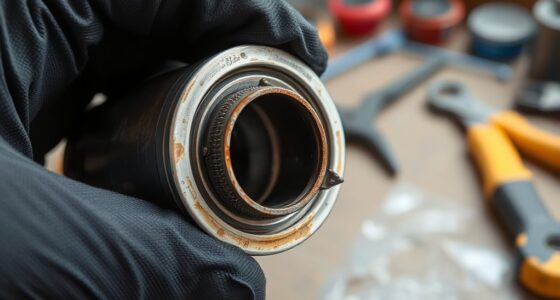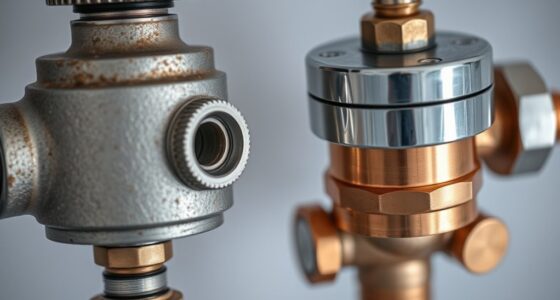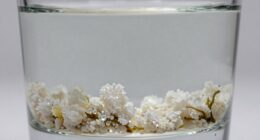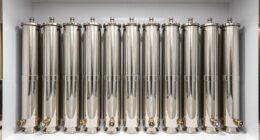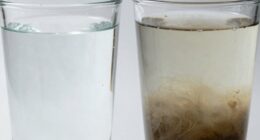A rotten egg smell after replacing your filter usually means bacteria or mineral buildup related to sulfur is causing the odor. It can happen if bacteria grow in your system or if the new filter releases residues. To fix this, you should inspect and clean your system, replace filters as needed, and consider sanitizing your setup. If you keep experiencing issues, there are additional steps to improve water quality, which you’ll explore further.
Key Takeaways
- Rotten egg smell after filter replacement often results from bacterial activity producing hydrogen sulfide.
- Initial odors are normal due to manufacturing residues or system break-in; persistent smells need inspection.
- Bacteria thrive on organic matter in filters, leading to sulfur odors; regular cleaning reduces this risk.
- Conduct water testing and inspect filters for biofilm or mineral buildup to identify odor sources.
- Regular maintenance, filter replacement, and shock chlorination help prevent bacterial growth and odor recurrence.
Causes of Sulfur Odor in Water

Sulfur odor in water often results from naturally occurring bacteria that produce hydrogen sulfide. These bacteria thrive in environments with low oxygen levels, especially in underground water sources. When you don’t have effective water purification, these bacteria can multiply, releasing hydrogen sulfide gas that causes the rotten egg smell. This odor can also develop when organic materials decompose in your plumbing system or well. To tackle this, proper odor removal methods are essential. Using activated carbon filters or aeration systems can help eliminate the smell by removing the hydrogen sulfide gas. Regular maintenance of your water system and ensuring thorough water purification can prevent the buildup of bacteria responsible for this odor, providing fresher-tasting water free from sulfur-related smells. Additionally, understanding the living conditions that favor bacteria growth can help in designing more effective treatment strategies.
Why the Smell Appears After Replacing the Filter
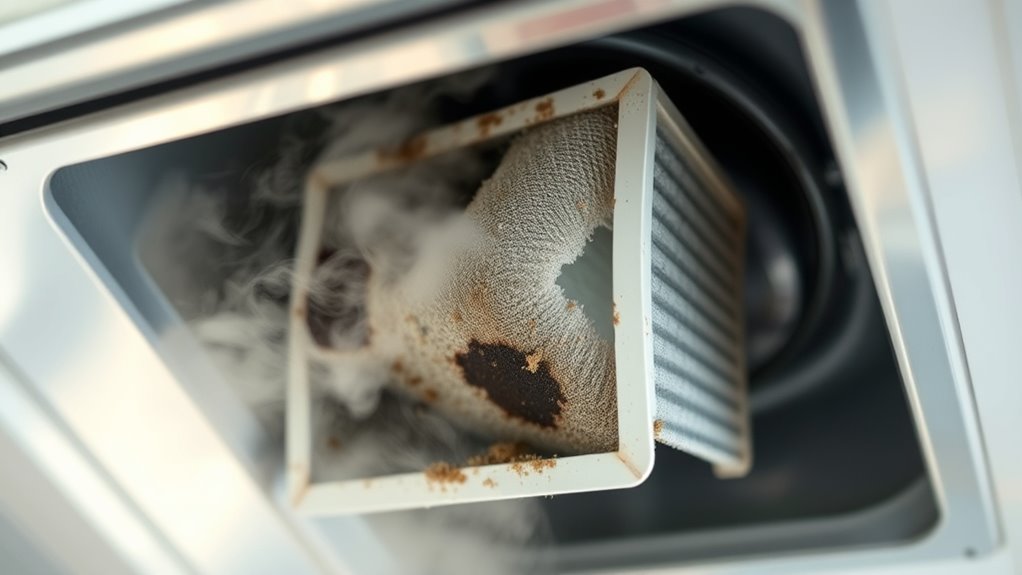
After replacing your filter, the rotten egg smell can suddenly appear. This often happens because residual bacteria or impurities in the system release odors during the switch. Additionally, new filter materials or the system’s initial break-in period may contribute to the odor temporarily. Implementing regular maintenance can help prevent odor buildup and ensure the system operates smoothly.
Residual Bacteria Accumulation
Residual bacteria can build up in your filter and surrounding system over time, and when you replace the filter, these microorganisms may become active again. This bacterial growth often results from filter contamination, where bacteria thrive in damp, nutrient-rich environments. As the old filter traps organic matter and moisture, it becomes a breeding ground for bacteria. When you install a new filter, these bacteria can resuspend into the airflow or water flow, releasing foul odors. The smell may persist until you thoroughly clean the system or replace contaminated parts. To prevent this, regularly clean your system, ensure proper drying after maintenance, and consider using disinfectants to reduce bacterial buildup. Addressing residual bacteria helps eliminate the rotten egg smell caused by ongoing bacterial activity. Incorporating AI-powered diagnostics can help monitor and detect bacterial growth early, preventing odor issues before they develop.
Filter Material Odor
Have you ever noticed a rotten egg smell immediately after installing a new filter? This odor often comes from the filter material itself, which can emit unpleasant smells due to manufacturing residues or absorbed odors. As the filter material interacts with the air, it can temporarily release sulfur-like odors. To reduce this, consider these points:
- The new filter may contain chemicals that need time to dissipate
- Odor absorption occurs as the filter captures particles and gases
- The smell should fade as the filter stabilizes
- Proper ventilation helps speed up odor dissipation
- Filter material composition can influence initial odors and how quickly they dissipate
Understanding that the filter material can be a source of initial odor helps you realize it’s usually temporary. If the smell persists, it might indicate a need for a different filter type or additional cleaning.
Initial System Break-In
When you replace your filter, the new system often releases a temporary smell because it’s undergoing a break-in process. During the initial system, the components and filter installation can emit odors as they settle and burn off any manufacturing residues or oils. This initial period helps the system stabilize and reduces odors over time. The rotten egg smell might appear after replacing the filter because the system’s new parts are adjusting, and any residual compounds are off-gassing. Typically, running the system for a few hours helps dissipate these smells. If the odor persists beyond this break-in phase, it might indicate a different issue, but most often, it’s just the system adjusting after initial system startup and filter installation. Additionally, understanding the components involved can help identify if the smell is normal or requires further inspection.
The Role of Bacteria in Producing Rotten Egg Smell
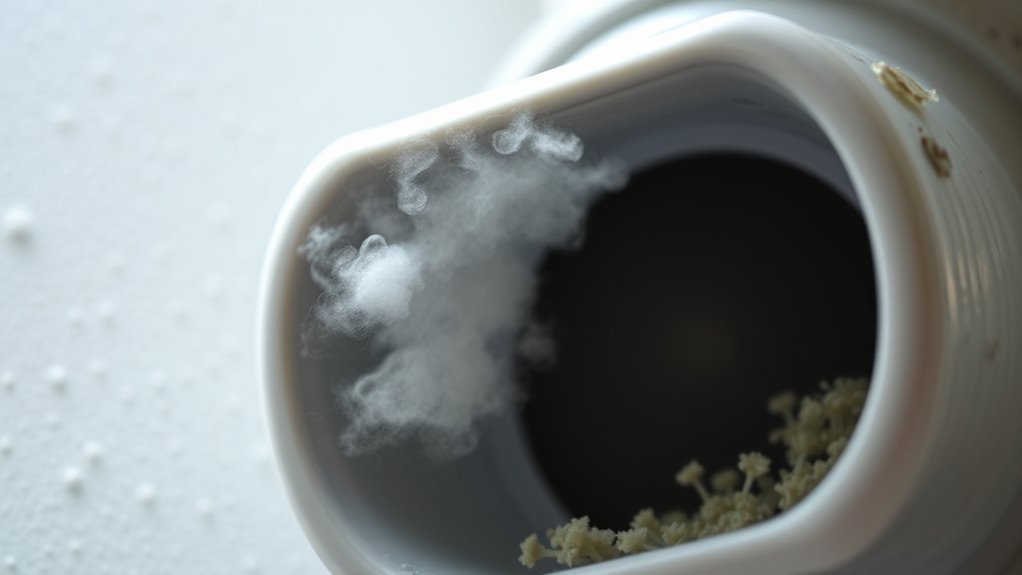
Bacteria play a essential role in producing the rotten egg smell often associated with water filters. When bacterial growth occurs inside your filter or plumbing, it can lead to odor development. These bacteria thrive in damp, nutrient-rich environments, especially if the filter isn’t regularly maintained. As they grow, they produce hydrogen sulfide gas, which causes that distinct rotten egg smell. To better understand this process, keep in mind:
Bacterial growth in filters produces hydrogen sulfide, causing the familiar rotten egg smell.
- Bacterial growth accelerates in stagnant water
- Organic matter fuels bacteria, increasing odor
- Poor filtration allows bacteria to multiply
- Regular cleaning can prevent odor development
- The contrast ratio of your filter and plumbing setup can influence bacterial growth and odor formation.
Understanding this connection helps you address the smell effectively by controlling bacterial growth and maintaining your filter properly.
Common Types of Water Filters That Can Cause Odors
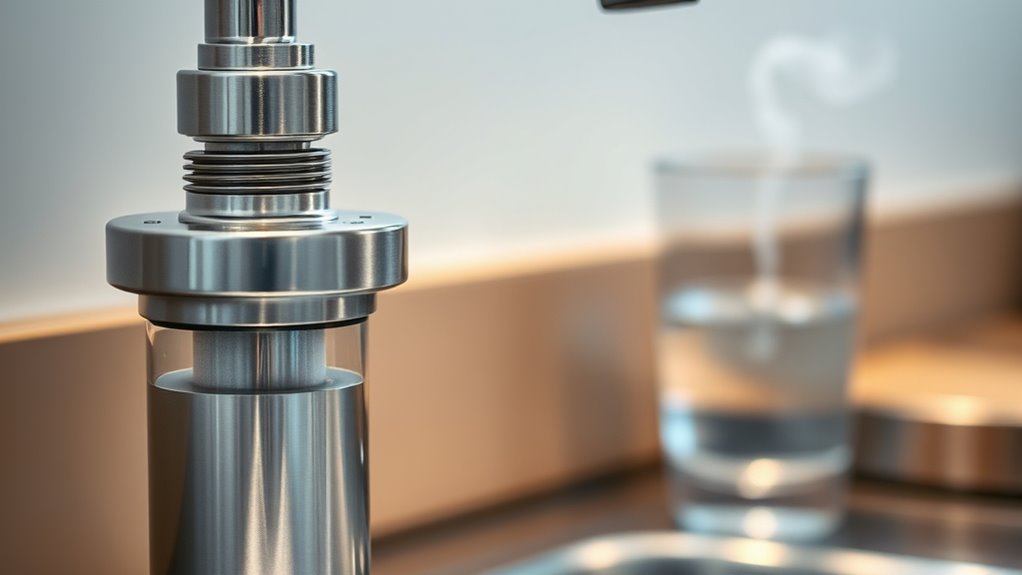
Certain types of water filters are more prone to causing odors due to their design and materials. For example, activated carbon filters are effective but can develop a rotten egg smell if not replaced within their essential water filter lifespan. Over time, bacteria can grow on the filter media, especially if the filtration technology isn’t maintained properly. Reverse osmosis systems are less likely to cause odors, but if their filters aren’t changed regularly, impurities can build up and lead to unpleasant smells. Likewise, sediment filters can trap organic material that fosters bacterial growth, resulting in odors. Knowing the specific lifespan of your filter and adhering to recommended replacement schedules is vital to prevent odors caused by the buildup of bacteria or other contaminants within these common water filter types. Additionally, regular cleaning and maintaining proper filter maintenance practices can significantly reduce the risk of odor development.
How to Detect if Your Water Filter Is the Source of the Smell
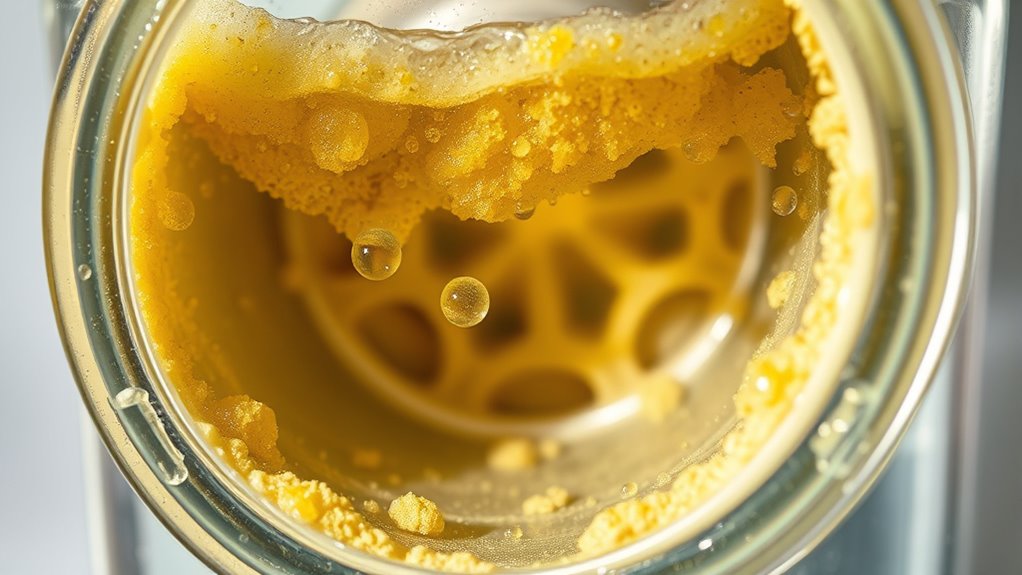
If you notice a rotten egg smell in your water, it’s important to determine whether your filter is the culprit before replacing other plumbing components. Start by inspecting your filter for signs of mineral buildup or biofilm, which can cause sulfur odors. Test the water directly at the filter’s outlet; if the smell persists, your filter may be contributing. Be aware that a pH imbalance can also promote bacterial growth, leading to odors. To check if your filter is the source, consider these steps:
- Remove and clean or replace the filter if it’s clogged or dirty
- Test water before and after the filter for sulfur smell
- Check for mineral buildup on the filter media
- Monitor pH levels to identify imbalance issues
These steps help confirm if your filter is causing the smell.
Steps to Eliminate Sulfur Odor From Your Water
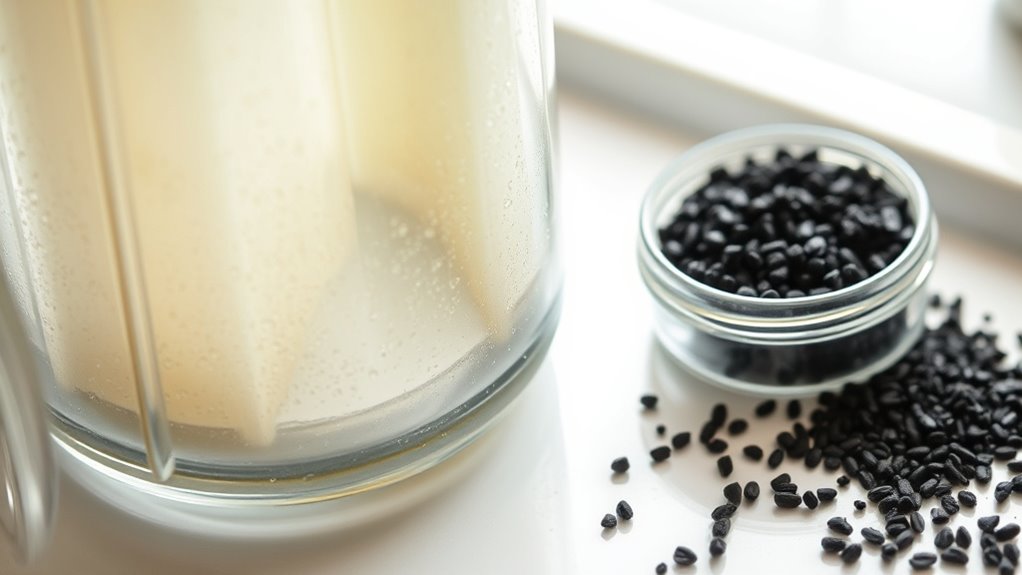
To effectively eliminate sulfur odors from your water, start by identifying and addressing the root cause. Conduct water testing to confirm the presence of hydrogen sulfide. Regular filter maintenance is essential; replace or service filters according to manufacturer instructions to prevent odor buildup. If testing shows high sulfide levels, consider shock chlorination or installing an oxidation filter designed for sulfur removal. Use the following table to choose the right approach:
| Issue | Solution | Maintenance Tip |
|---|---|---|
| Sulfur odor persists | Replace filter or upgrade to sulfur-specific media | Schedule routine filter inspections |
| High sulfide levels | Shock chlorinate or install oxidation filter | Test water periodically for ongoing monitoring |
| Odor after filter replacement | Confirm filter installation is correct | Clean and sanitize system regularly |
| No improvement after solutions | Consult a water treatment professional | Perform comprehensive water testing |
Additionally, understanding the source of hydrogen sulfide can help prevent future issues.
Preventive Measures to Avoid Future Odor Issues
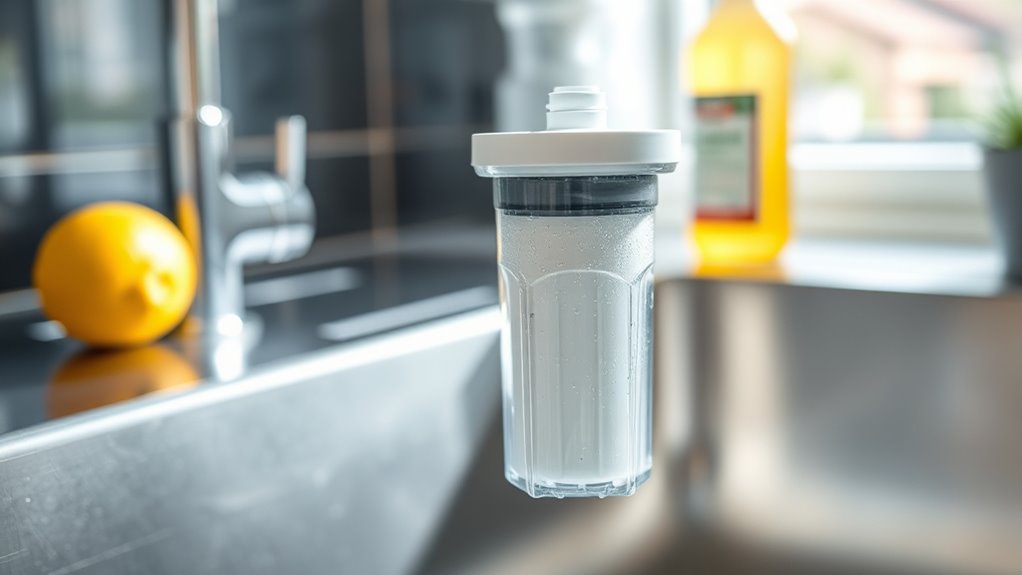
Preventing future odor issues starts with regular maintenance and proactive testing. You should schedule routine water testing to detect sulfur or other contaminants early. Proper filter installation is vital; verify filters are correctly fitted and compatible with your water system. To minimize odor risks, follow these preventive steps:
- Conduct periodic water testing to catch changes in water quality
- Replace filters according to manufacturer instructions
- Use high-quality filters suited for sulfur removal
- Maintain your system to prevent buildup and bacteria growth
- Staying informed about AI-powered water analysis technologies can help identify potential issues before they arise.
When to Consider Replacing Your Water Filter or System
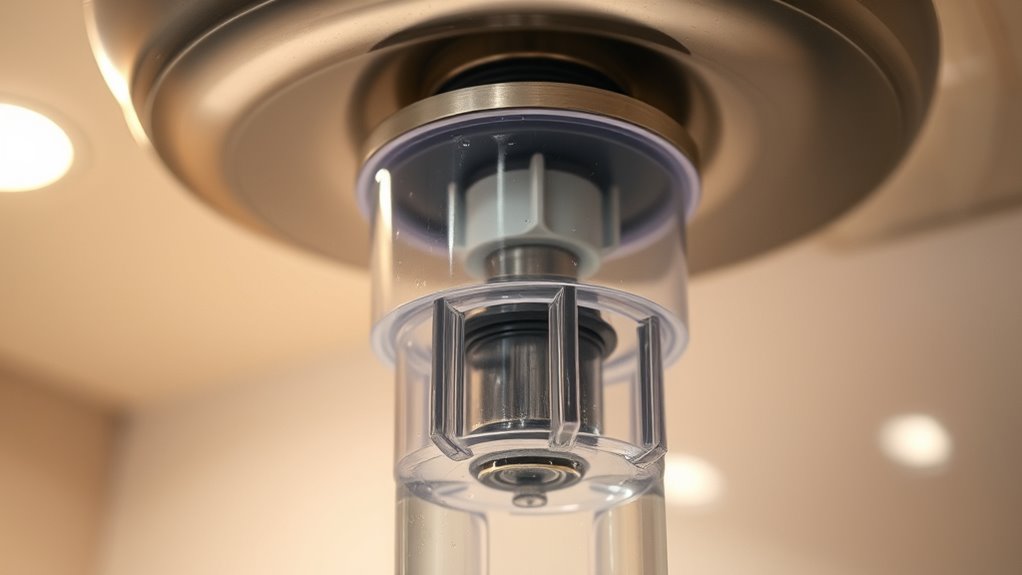
Regular maintenance and timely testing help keep your water system functioning properly, but sooner or later, your filters may need replacing. Over time, filters reach the end of their lifespan and become less effective at reducing water contamination. If you notice persistent odors, such as a rotten egg smell, or a decline in water quality, it’s a clear sign to contemplate replacing your filter or entire system. Most filters have a recommended lifespan listed by the manufacturer; exceeding this can lead to bacterial growth or reduced filtration efficiency. Regularly check for signs of deterioration, and follow your system’s maintenance schedule. Replacing filters promptly ensures you continue to get safe, clean water and prevents contaminants from accumulating. Proper maintenance extends the life of your filtration system and helps maintain optimal water quality.
Additional Methods to Improve Water Quality and Taste

Enhancing your water quality and taste can go beyond simple filter replacement by exploring additional methods. You can improve flavor and mineral content through water mineralization, adding beneficial minerals to enhance taste and health. pH adjustment is also crucial; balancing the acidity or alkalinity can reduce odors and improve overall water quality. To achieve these improvements, consider:
- Installing mineral filters that add calcium or magnesium
- Using pH neutralizers to balance acidic or alkaline water
- Regularly testing water pH and mineral levels
- Incorporating remineralization cartridges into your system
These methods help address taste issues and ensure your water’s mineral content and pH levels are optimized for better quality and safety.
Tips for Maintaining a Fresh-Smelling Water Supply
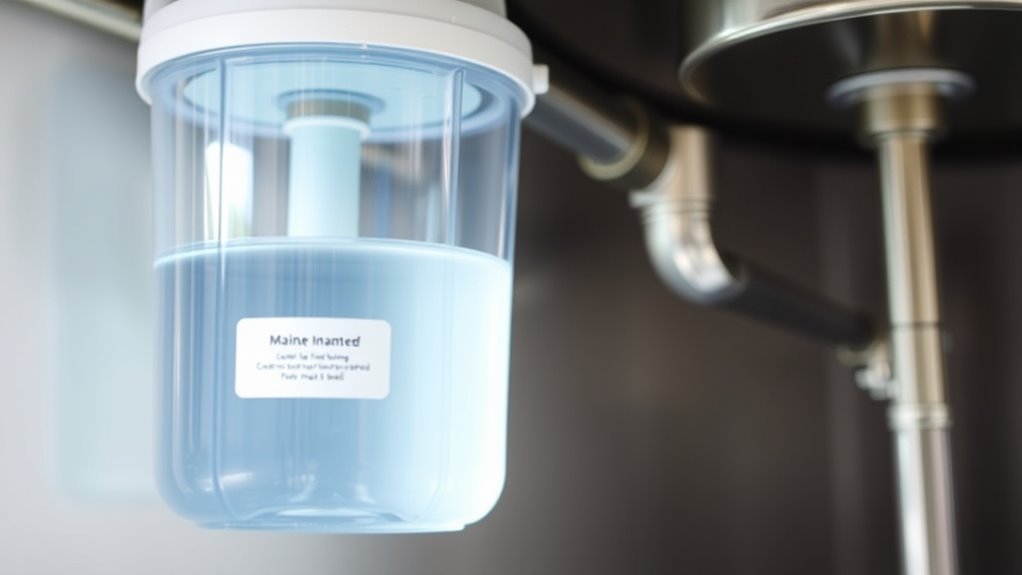
To keep your water smelling fresh, maintaining your filtration system properly and staying vigilant for potential odor sources is essential. Regularly replace or clean filters to guarantee effective chlorine removal, which can cause unpleasant smells if left unchecked. Check your water’s pH levels and adjust if necessary, as improper pH balancing can contribute to odors and taste issues. Keep your water softener and filtration system clean to prevent bacteria buildup, which can worsen rotten egg smells. Avoid altering your system with chemical additives unless recommended by a professional. Additionally, ensure your storage tanks are sanitized periodically. These steps help maintain a fresh, odor-free water supply, and reduce the risk of sulfur or other foul smells developing over time.
Frequently Asked Questions
Can Certain Household Chemicals Cause the Rotten Egg Smell?
Yes, certain household chemicals can cause the rotten egg smell. When you use chemicals containing sulfur or those that react with sulfur compounds, they can trigger sulfur reactions in your water or plumbing. These reactions release hydrogen sulfide gas, which produces that characteristic rotten egg odor. To prevent this, be cautious with chemicals like certain cleaners, fertilizers, or pesticides, and consider testing your water for sulfur-related issues.
Does Water Temperature Affect Sulfur Odor Severity?
Did you know that higher water temperatures can increase sulfur odor severity by up to 50%? Water temperature definitely impacts odor severity—warmer water tends to release more sulfur gases, making the rotten egg smell stronger. When your water heats up, sulfur compounds become more volatile, amplifying the odor. To reduce this, try cooler water or install a treatment system designed for sulfur removal, and you’ll notice a fresher smell.
Are There Specific Brands More Prone to Odor Issues?
Some brands are more prone to odor issues because of their reputation for using lower-quality filter materials. You should research brands known for high-quality filters, as these tend to better remove sulfur compounds and prevent rotten egg smells. Look for reviews and product specifications to confirm you’re choosing a reputable brand with reliable filter materials. This way, you can reduce the chances of experiencing unpleasant odors after installing your water filter.
How Long Does It Typically Take to Eliminate the Smell?
You might find that the rotten egg smell disappears within a week after proper filter maintenance, but it depends on your water source. If the odor persists, it’s likely due to sulfur bacteria or mineral buildup. Regularly replacing filters and cleaning your system can speed up the process. Be patient—sometimes it takes a few weeks for the smell to fully go away, especially if your water source has high sulfur content.
Can Installing a Different Filter Type Prevent Odor Recurrence?
Yes, installing a different filter type can help prevent odor recurrence. When you choose a filter with activated carbon or other odor-absorbing materials, it improves odor prevention and reduces the chances of that rotten egg smell coming back. Regular filter replacement is also essential, as it guarantees these odor-absorbing properties stay effective. By selecting the right filter and maintaining it properly, you’ll keep your air fresh and odor-free.
Conclusion
So, next time your water smells like rotten eggs, don’t just hold your nose and suffer in silence. Check your filters, question those bacteria, and maybe rethink your water system. After all, who knew that a simple filter change could turn your tap into a sulfur spa? Stay vigilant, stay fresh, and remember: your water’s aroma is your home’s secret handshake—so decode it before it becomes a permanent stench.



